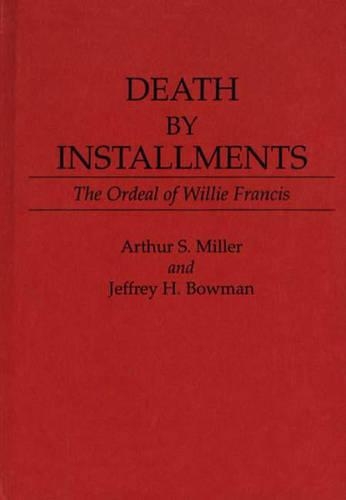
Death by Installments: The Ordeal of Willie Francis
(Hardback)
Publishing Details
Death by Installments: The Ordeal of Willie Francis
By (Author) Arthur S. Miller
By (author) Jeffrey H. Bowman
Bloomsbury Publishing PLC
Praeger Publishers Inc
16th August 1988
United States
Classifications
Tertiary Education
Non Fiction
347.305773
Physical Properties
Hardback
189
Description
The principle revealed in Death by Installments is that the Eighth Amendment's prohibition against cruel and unusual punishment does not guarantee protection to black men who kill whites. Reading the carefully researched and well-told story of Willie Francis offers a four-decade-old view of both the society's commitment to this principle, and the Supreme Court's unwillingness then and now to challenge it. Derrick Bell, Harvard Law School not just a `good' but a splendidly written, expertly researched, grippingly told, and passionately presented tome that can proudly take its place alongside Anthony Lewis' Gideon's Trumpet. Henry J. Abraham, University of Virginia The case of Willie Francis has been scrutinized and reexamined over the past several decades, and it is still not clear whether he was guilty of the crime for which he was executed in Louisiana forty years ago. Miller and Bowman's book recounts the ordeal of this teenaged black youth who was sent a second time to the electric chair a year after repeated attempts to supply enough current to kill him failed. His tragic story raises disturbing questions not only about capital punishment itself but about the humanity of our methods of carrying out executions and our capacity as a nation to uphold fundamental rights guaranteed by our Constitution. Miller and Bowman describe Francis' experiences from the time of his arrest, and they review the legal struggles within the Supreme Court that followed the botched execution attempt. In considering Eighth Amendment provisions against cruel and unusual punishment, the Court held that Willie Francis' previous subjection to electrical current did not make his subsequent electrocution any more cruel in the constitutional sense than any other electrocution. The authors examine the far-reaching implications of this stand in light of the many similar--but unpublicized--incidents of prolonged, agonizing executions by electrocution, gas, and even lethal injection. They contend that the Court has never faced the issue squarely and that its failure to set limits on the inflicting of pain in the Willie Francis case renders the Eighth Amendment guarantee meaningless.
Reviews
The death penalty--its morality, constitutionality, social effects--will remain a controversial subject for years. Miller and Bowman's account of Willie Francis's double execution provides an excellent framework within which to consider (or reconsider) the death penalty debate. In addition to this case study, the book provides a lucid insight into the political and judicial processes that govern our lives. The authors tell the story of a black teenager sent to the electric chair twice within one year because the first execution attempt failed. They also raise important questions about the death penalty, including its humanity, our methods of execution, our constitutional rights and the possibility of executing an innocent person. Most important, a question that permeates the book is `Do the methods of execution violate the cruel and unusual punishment provisions of the Eighth Amendment' Miller and Bowman present the case clearly and dramatically, from the botched execution to the successful execution; they also forcefully and thoughtfully explain the Francis case in between these two events. The endnotes, bibliography, and index are quite good. The book can be read by anyone with an interest in the issue, and is highly recommended for public and undergraduate libraries. * Choice *
Death by Installments is legal history on an award-winning scale. In addition to their comprehensive presentation and analysis of the case itself, the authors appropriately remind us that blacks were still powerless in the South of the 1940s, which guaranteed that Willie Francis would receive prejudicial treatment at the outset in Louisiana. . . . No historian, attorney or sensitive layman can finish this book without learning something more about human frailty, the imperfection of the law, and man's ongoing inhumanity to man. * The American Journal of Legal History *
[This book] is not just a 'good' but a splendidly written, expertly researched, grippingly told, and passionately presened tome that can proudly take its place alongside Anthony Lewis's Gideon's Trumpet. Death by Installments combines in expert measure the grisly tale of Willie Francis's double electrocution with the kind of insight into the judicial process that provides a much-needed comprehension of the machinery of government and politics. Not only do the authors engage our emotions, they appeal to our sense of justice while presenting us with the necessary facts to allow informed judgments. * Henry J. Abraham, University of Virginia *
Author Bio
ARTHUR S. MILLER was Professor Emeritus of Law at George Washington University. JEFFREY H. BOWMAN is Assistant to the Chairman of the Federal Elections Commission.
